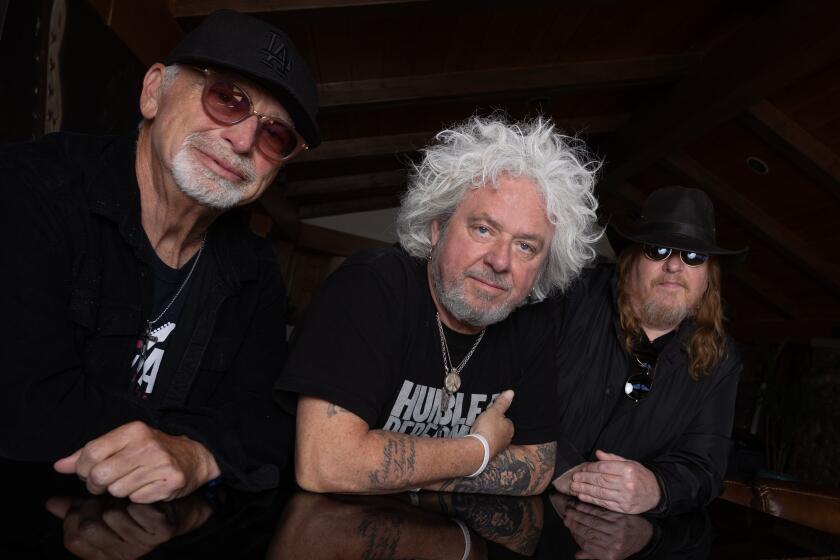Nothing Compares 2 Sinead O’Connor
D ublin’s Sinead O’Connor, New York’s Public Enemy and “Twin Pe” Julee Cruise are spotlighted in this edition of the $25 Guide--a blueprint to keeping up with what’s exciting in pop music on a record budget of $25 a month (about $45 for CD buyers).
March
Sinead O’Connor’s “I Do Not Want What I Haven’t Got” (Chrysalis)--Is “Nothing Compares 2 U” going 2 end up as the most absorbing single of 1990? Is “I Do Not Want What I Haven’t Got” going 2 stand as the best album of 1990? I’d hate to bet against either possibility. Few albums since John Lennon’s “Plastic Ono Band” have offered this much artful intensity and naked revelation. Might as well just say it: This is a brilliant work.
Elvis Presley’s “The Million Dollar Quartet” (RCA)--Finally available in a domestic version, this album is 67 minutes of matchless rock history. Rather than yet another collection of oldies, it serves up the 1956 jam session during which a young Presley, Jerry Lee Lewis, Carl Perkins and (rarely audible) Johnny Cash sing some gospel, country and R&B; songs in an informal, good-natured spirit that defined the optimism and adventure of early rock.
Lisa Stansfield’s “Affection” (Arista)--On casual listening, it’s easy to assume that this is one of those albums where a producer such as Quincy Jones or Richard Perry uses a different singer on each track to provide just the right vocal nuance. But Stansfield, a most appealing 23-year-old singer from England, handles all the soul-based styles, from Chaka Khan sass to Gladys Knight glide, with equal authority and ease. Lively, seductive and intelligent, this could be 1990’s “The Raw and the Cooked.”
April
Julee Cruise’s “Floating Into the Night” (Warner Bros. Records)--Here’s another reason to love “Twin Peaks.” This package of ingeniously veiled, ‘50s-haunted songs by David Lynch (lyrics) and Angelo Badalamenti (music) was largely ignored when released last fall. But Cruise’s appearance in the opening episode of Lynch’s wonderfully dark and obsessive TV series should win considerable hearts and ears. Cruise was the one who, against all odds, was singing this arty, urban music in a bar where you know that in real life everyone would be listening to Hank Williams Jr. on the jukebox. More than her understated vocals, however, the real lure is Badalamenti’s music, which recalls the exotic tension and wonder of Ennio Morricone.
Digital Underground’s “Sex Packets” (Tommy Boy)--This Oakland rap group isn’t as boldly experimental, texturally, as De La Soul, but it makes some dazzling turns, thematically, as its asserts a sly, humorous persona. Beware: Some of the language, including the sexual fantasy outlined in “Freaks of the Industry,” would make a First Amendment watchdog committee blush.
Public Enemy’s “Fear of a Black Planet” (Def Jam/Columbia)--It takes a while for things to catch fire, but once Chuck D. really starts fighting the power in such splendid tracks as “Who Stole the Soul?” and “Burn Hollywood Burn,” the impact is as arresting as the group’s 1988 landmark, “It Takes a Nation of Millions to Hold Us Back.”
More to Read
The biggest entertainment stories
Get our big stories about Hollywood, film, television, music, arts, culture and more right in your inbox as soon as they publish.
You may occasionally receive promotional content from the Los Angeles Times.










